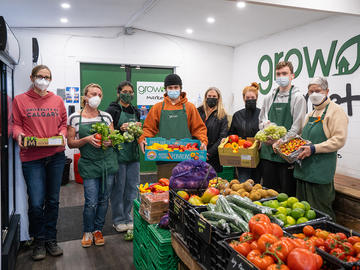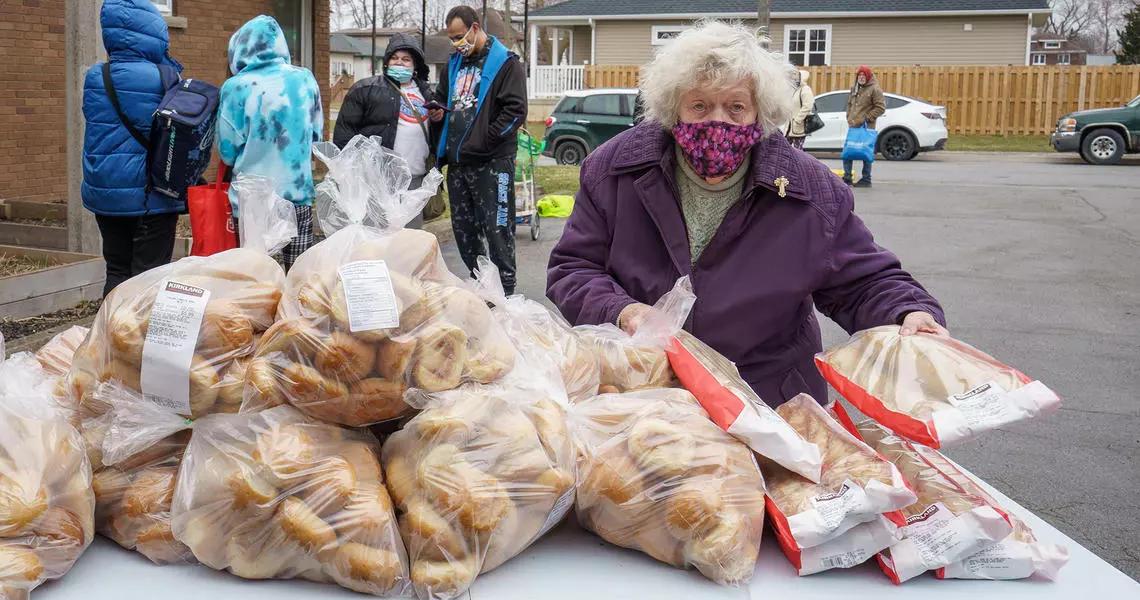Lack of affordable, fresh groceries inspires UCalgary student to launch new community service
- Jul 15, 2023
- 4 min read

Overcoming systemic barriers, GROW Community Food Literacy Centre creates welcoming, dignified environment for local residents By Gillian Edwards - April 14, 2022. Think of your best memory, one that gives you a feeling of warmth and joy. Was there a meal involved? For many of us, food is more than fuel to get us through the day. It’s the foundation of culture, traditions, and memories. And for millions of Canadian households, food is hard to come by, leading to missed meals or compromised quality and nutrition.
When Pam Farrell, a doctoral candidate in the Werklund School of Education at UCalgary, moved to the Niagara region to teach elementary and adult education, she didn’t expect a lack of good food living in one of Canada’s richest fruit-producing areas, called a fruit belt. Niagara is the buckle of the belt, after all.
“When I was teaching in the area and worked with parents, they told me there’s no place for food. There’s a liquor store, beer store, dollar store, but there’s no access to affordable groceries,” she says.
“Traditional food programs don’t meet the needs for low-income residents when it comes to food security. Food banks are meant to be for emergency, temporary use, not a long-term solution. We needed something sustainable, accessible, focused on fresh produce, meats, dairy, and alternatives.”
Farrell is in her fourth year of the Language and Literacy program at UCalgary, which aims to teach students about different dimensions of literacy, beyond what we typically define as reading and writing. The doctorate in education is geared to professionals who are working in the community but want to take research skills into their work.

The GROW centre offers a subsidized weekly market focused on fresh groceries as well as food literacy programming and advocacy.
Food literacy through a social justice lens
“Pam has done an incredible job of taking a problem she was interested in and translating it into a real-world, actionable item,” says Erin Spring, associate professor in the Werklund School of Education. “A lot of us research in sort of a silo, where we write about something and publish it, but she’s applying it to the community in practice.”
It was Spring’s course in multiliteracy that inspired Farrell to look at literacy through a social justice lens, especially how we limit certain groups of people from accessing food and systemic barriers to food.
Food literacy is the skills, knowledge, and attitudes related to food, and it’s where Farrell has dug into her research. It’s also the bedrock of her solution to Niagara’s food access problem: GROW Community Food Literacy Centre.
The service, the first of its kind in Canada, offers a subsidized weekly market focused on fresh produce, meats, dairy, and importantly, alternatives that aren’t available in typical food programs. They also offer food literacy programming and advocacy, with an eye to influence the systems that create food insecurity in the first place.
“I wanted to change the way people were accessing food and provide it in a dignified, welcoming environment,” she says.
Access to food makes a big difference
And while food skills are important, they don’t matter much if the only food you can afford is from the dollar store. “If we only focus on the skills to increase health, we miss the access part that would make a difference in their daily lives. If people can’t get good food, it doesn’t matter. At the end of the day, it’s what people can buy and bring home.”
Spring adds, “Through Pam’s research, I am learning it’s about so much more than food. It's about resiliency, combating racism, and poverty. People might come because they are food insecure, but they are finding relationships and community.”
The response has been overwhelmingly positive, with notes from Niagara Falls’s mayor to a L’Oréal Women of Worth award for Farrell. But it’s the 15,000 service points, the 25 volunteers who have been alongside since the start, and the immense gratitude from members that are the most rewarding.
“The stories that members tell me and how it helps them, hearing that — it’s worth the last two years of work,” says Farrell. “Having the food you like at home and providing for your family is more than food security. It’s meeting your social needs and cultural needs. Food is not just food — it's ownership and empowerment and dignity.”
GROW has made a difference in my life because I can now afford to eat healthy and feed my kids healthy food for less. I used to buy food just because it was on sale so that we can have something to eat, even though I knew it wasn't healthy, but I had no choice. – Margaret, GROW member
A day at the GROW food centre
GROW was there for me all through COVID. Being new to the area and not knowing anyone it was my lifeline on Saturday mornings. A place to go visit the many volunteers and purchase fantastic groceries. – Carol, GROW member
GROW has been able to help me meet my dietary needs, as I have diabetes as well as recovering from cancer treatment. Finding a place to get affordable low sodium/sugar, high protein, and fresh veggies/fruit was very hard until I found GROW. – Shawn, GROW member

































Comments